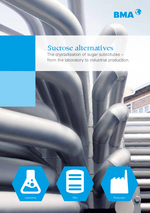
Sucrose alternatives
The crystallisation of sugar substitutes – from the laboratory to industrial production.



Because of their respective chemical structures, polyols have different chemical and physical properties. Individual sugars and sugar substitutes therefore differ also in terms of their solubility, crystal growth and crystal shape. This requires different approaches in crystallisation and in all other process steps.
Information about solubility is a basic requirement for carrying out systematic crystallisation tests. Unlike pure solutions, technical solutions are subject to process-based and raw material-dependent contaminations. As these contaminations have an impact on the solubility of the main constituent, a first step is to determine exact solubility data as a function of the purity, dry substance content and temperature of the solution in the laboratory. With these data, the basic parameters for crystallisation tests can be established and first estimates of the crystallisation process made. Laboratory-scale testing is used to determine or verify material properties for the configuration of the crystallisation processes and the apparatus; to rate crystallisation properties; and to assess the feasibility of crystallisation trials on the pilot scale. If required, testing can include the complete process chain – from evaporation to crystallisation and separation, to drying.
Material properties




Process data






Sugar alcohols in the polyol group
++ Erythrite / erythritol ++ xylite / xylitol ++ mannite / mannitol ++ sorbitol ++ maltitol ++ lactitol ++ isomalt ++

